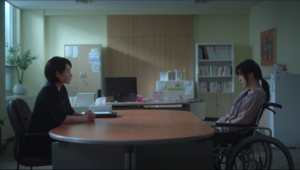
The latest in Netflix’s continuing portfolio of Korean productions, Juvenile Justice certainly understands the art of the cold open. Opening shots of a neon-lit Seoul-scape at night pan slowly to reveal a young boy stumbling through the streets, disoriented and asking for help. When he eventually reaches a police station, he meets an officer, who realises that the boy is covered in blood and holding an axe. The boy confesses that he has killed someone, who we later learn is an eight-year-old child. It is certainly attention-grabbing.
As the intensity of this opener implies, Juvenile Justice is a show that deals with some of the most unpleasant and morally uncomfortable ideas in society. In particular, as the title makes clear, the focus is on minors and their relationship to crime and punishment, which we see through the eyes of the cold, ruthless judge Sim Eun-seok. Played by the notoriously versatile Kim Hye-soo (from the likes of Tazza and Signal), alongside Kim Mu-yeol (Forgotten), Lee Sung-min (The Witness) and Lee Jung-eun (from a little thing called Parasite), the drama unfurls as a procedural-style piece that plays with ideas of innocence and culpability deftly.
As the latest from Netflix’s production line it follows several trends that other Korean dramas the company has produced have established, to both positive and negative effect. The moral debates within the show are well presented, the performances well-placed to deliver them, and the cinematography unfailingly high-grade. However, there are issues with pacing that do occasionally give the story a lag that undermines some of its power.
I mention Netflix so prominently at the outset because their influence on the form of Juvenile Justice feels clear. Much like any content produced for a streaming site in comparison with that produced for traditional TV outlets, this show is relatively free to play with series and episode length, as well as with the themes that it handles. Whilst in terrestrial K-dramas even knives get blurred out when used as weapons, no such limits apply on a streaming platform. This allows Juvenile Justice the space to delve into some of the most sensitive topics possible without having to cut any corners. Much like Squid Game and All Of Us Are Dead had intense gore and violence, and D.P had unflinching depictions of hazing and psychological torment, so too does this show explore topics of child murder, psychosis, sexual assault, abuse, and beyond.
In exploring these themes, Juvenile Justice works hard to provide a nuanced and compassionate angle. The most basic way that this is achieved is through the two central characters of Eun-seok and Cha Tae-joo (Kim Mu-yeol), the two judges at Yeonhwa Juvenile Court. Eun-seok is introduced as the hard-nosed, dispassionate new face to Tae-joo’s caring, empathic softness, the former openly despising juvenile offenders as much as the latter works to mentor and support them. It’s not a new or original set-up, and it’s clear that our stoic, expressionless Eun-seok is going to have her outlook challenged and her attitudes softened as the series progresses.
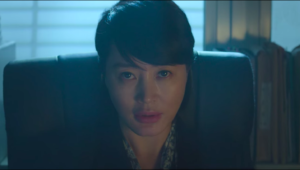
Whilst there is a predictability in these characterisations—she’s always going to be overly harsh at first, and he’s always going to baulk at that and tell her to be more understanding—the performances elevate them significantly. Kim Hye-soo in particular, mostly manages the difficult job of making a character who is not at all emotionally expressive a compelling one to watch. Kim Mu-yeol is also understated enough that his bleeding-heart persona never drags into sanctimony or irritation.
Similarly, the narrative is also balanced enough that the stories told feel layered, rather than like the table-banging PSA announcements that they could be in the wrong hands. From stories of high school students cheating on their exams to try and get into Seoul University, to more extreme tales of thirteen-year-old schizophrenics and their psychopathic friends murdering a child, there is always an insight into multiple perspectives.
Sometimes, this is literally achieved through cleverly retelling scenes twice as different characters experience (or wish to portray) them, as in Episode 4. In this episode, we see virtually word-for-word, two identical dinner scenes at a home for girls, one where the manager is a domineering abuser, and the other where the girls themselves are uncaring and brattish. Again, it isn’t a new device by any means, but it is delicately employed here to illustrate how different people are invested in different versions of stories.
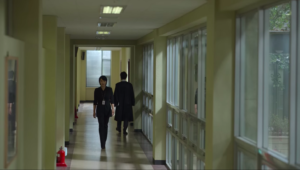
More than this though, it is the show’s settings and smaller moments that highlight the nuances in dealing with juvenile crime. It is in the shots of the children being handcuffed and taken away in tears after sentencing, the conversations between co-workers in the corridor, or the confessional breakdowns that follow the teenagers’ disruptive behaviour, that we see the humanity eking through. The children who perpetrate crimes in this story, as well as their victims, always remain children and are always shown as such, allowing the show to achieve greater depth in its storytelling.
The cinematography, again unsurprisingly given the production company, is also perfectly executed to illustrate the various perspectives and relationships in the drama. The courtroom is often shot symmetrically, with Eun-seok specifically given many close-ups showing her dead-centre of the frame as she hands out verdicts. In these frames and in these moments, she is in power. However, there are also multiple shots of long corridors or huge offices, with single figures dwarfed by their surroundings. We also see several shots through windows or glass, a nod to the layers of perspective that the show is working with. The camera angles here are always knowing, and the framing is always purposeful. It compounds the richness of the world we are in effortlessly, as seems standard for Netflix productions in Korea by this point.
This storytelling is also allowed to be as rich as it is by virtue of the show’s structure. In this aspect as well, Juvenile Justice again benefits from being a Netflix production, as the ties to certain episode lengths do not exist in the same way as they would on television. Because stories do not have to be tied up in 42 minutes or less, they are able to sprawl and develop across 2 episodes or more. In regards to the stories of the juveniles themselves, this works well, for example in episodes 4 and 5, where a brattish group of juvenile girls run away from their care home.
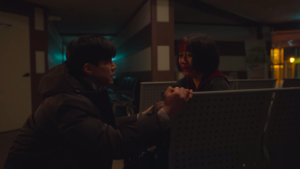
In a tighter narrative, these characters may not have the time to swerve from innocent, to scheming, to lost and confused as they do across a 2-episode story arc here. The time given to develop their story is what allows these characters to become layered and complex, to give us as an audience an understanding of the different forces acting on their behaviour and decisions. In a drama handling such difficult topics, this really is necessary.
However, as much as this freer, looser narrative structure gives characters ample time to develop, and moral conundrums time to unravel, it also makes the show uneven. This may perhaps be due to the length of the show: ten episodes all coming in at about an hour. To contrast with similar work, D.P had 6 episodes of 45-50 minutes, and Move To Heaven averaged 45-55 minutes over 10 episodes. Both of these dramas similarly tackled intense emotional and social issues in a procedural-esque format, and both had stories that spread over multiple episodes. Nevertheless, the relative tightness of their running time in comparison to Juvenile Justice made their narratives a bit more compact, a strength missing in this show.
Whilst the show length may have been a decision made to show the fullness of trial procedures and the various stages of bureaucracy and debate as an essential part of the legal process, it does ultimately make episodes drag. It is important to show that law is complicated, and often unhelpfully so, but laying this out in the story itself makes certain narratives feel a little too drawn out. There are many moments of high drama and adrenaline in this show, but the spaces in-between these were perhaps given a little too much freedom, making the overall drama lag at times.
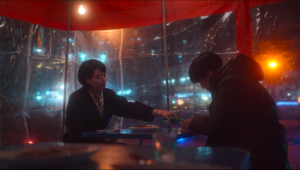
Ultimately, Juvenile Justice is a success in bringing the more procedural crime drama elements to a Korean production. Unafraid to breach difficult topics and equally unafraid to show the complex situations that create them, the show is a powerful look into how Korea, and all of us as the audience, views juvenile crime and justice. In its commitment to laying its stories out in their full complexity it does become uneven, but in its high moments is a suspenseful and powerful story. It is exciting to see that Netflix’s Korean productions are continuing in this high-quality vein, and it is hopefully indicative of more thoughtful social commentary and moral questioning to come.
(MyDramaList, YouTube. Images via Netflix.)


